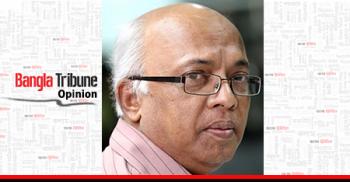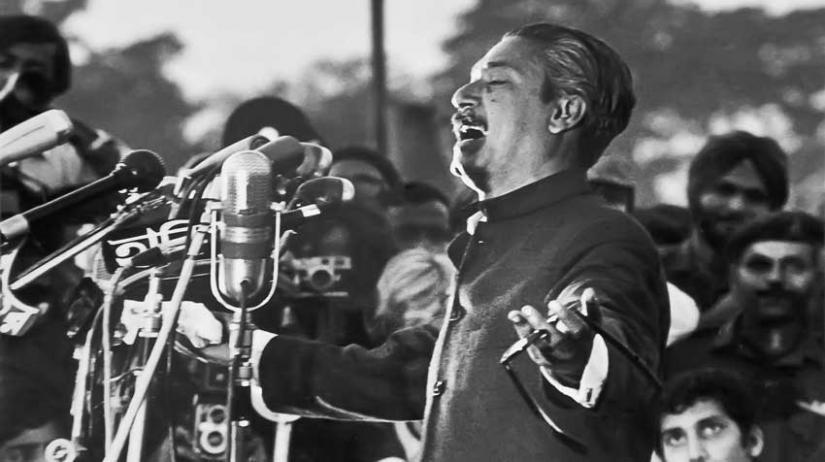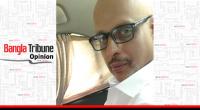 Bangabandhu Sheikh Mujibur Rahman was one of us. He is part of us even as he, on an expansive canvas, is part of history.
Bangabandhu Sheikh Mujibur Rahman was one of us. He is part of us even as he, on an expansive canvas, is part of history.
That pipe was his trademark. No matter where he happened to be --- in prison or at home or at conferences or meeting foreign heads of government --- that pipe was his constant companion. Bangabandhu was fond of that pipe, which he filled with Erinmore tobacco. In his conversation with the celebrated British television host David Frost in early 1972, he made it a point to let the latter know just how important that pipe was to him. And he smoked it in style, in grandeur. To his already pronounced gravitas, the pipe only added more of it, with a dash of elegance befitting a statesman.
It was a habit that suited the Mujib personality only too well. Tall for a Bengali --- he was above 6 feet in height --- with a thick moustache that enhanced his hold on the public imagination, with a voice that was deep and profound, with thick, old-fashioned spectacles adding substance to his personality, the leader of the Bengali nation mesmerized audiences both at home and abroad. On his way back home from London by way of Delhi in January 1972, as he rose to address an Indian crowd come to see him after all those months of war in his newly independent Bangladesh, he began his remarks in English. The crowd, almost all of whom were non-Bengalis, was in the mood for his famous speech-making skills in Bengali. Indira Gandhi, sensing the desire of the crowd, requested him to speak in his native Bengali. The result was a powerful enumeration of his thoughts about politics, about his struggling country, about India’s contribution to Bangladesh’s efforts to free itself of foreign subjugation.
It was quintessential Mujib. Nearly ten months in solitary confinement in Pakistan, with no access to newspapers, radio and television, had not dimmed his ardour when it came to a discourse on politics. He spoke without notes, as he always did, captivating his audience. That too was part of his character. His oratory was all. He stood tall and erect as he spoke, moving his head from side to side, as if telling the crowd he had them all in his vision, that everyone was part of the occasion. And then there was that famous finger which rose steadily in the air as he spoke, to emphasise the point he was making. The finger symbolized his grit and his determination at the 7 March 1971 rally in Dhaka. But, then again, the finger had been an essential component of Bangabandhu’s body language.
Bangabandhu made it a point to look his visitors or his hosts in the eye as he conversed with them. Not for him a shifty attitude, not for him any nervousness or shyness. At the Round Table Conference in Rawalpindi in February 1969--- and that was only within days of his release from the Agartala Case --- he looked at his tormentor Ayub Khan directly as he shook hands with him. It was Ayub who was unable to match Mujib in that moment of drama in the history of Pakistan. Confidence was natural to Mujib. At the White House, in 1974, he sat with crossed legs, puffed on his pipe as he spoke to US President Gerald Ford. The old charisma was there. Indeed, his charisma never went away, never died. He lighted up a room, any room, he made his way into. There was little of the formal about him, but much of garrulity was there. It was his voice which boomed across the place, wherever he happened to be. When to that voice was added humour, the results were electric. Mujib’s sense of humour was legendary. He could crack jokes; he could mimic other politicians. And he had the ability to laugh at himself. In conversation, his laughter came from deep within, loud and reverberating. There was the deeply natural about it. He was the life of the party. People --- simple citizens as well as reputed politicians and statesmen --- were put at ease in Bangabandhu’s presence. His banter, his good-natured arguments, his wit all made people feel comfortable in his presence. He was Father of the Nation, he was Prime Minister and he was President. But to everyone around him, to every citizen of Bangladesh, he was Sheikh Shaheb or he was Mujib bhai or he was simply ‘Amago Muzibor’. To the country at large, he was Bangabandhu. He thus shared a high pedestal with Deshbandhu Chittaranjan Das and Netaji Subhash Chandra Bose, both men he adored and respected from deep within his soul. All three men were Bengalis and all three were free of the pretensions which often have characterized other politicians.
People --- simple citizens as well as reputed politicians and statesmen --- were put at ease in Bangabandhu’s presence. His banter, his good-natured arguments, his wit all made people feel comfortable in his presence. He was Father of the Nation, he was Prime Minister and he was President. But to everyone around him, to every citizen of Bangladesh, he was Sheikh Shaheb or he was Mujib bhai or he was simply ‘Amago Muzibor’. To the country at large, he was Bangabandhu. He thus shared a high pedestal with Deshbandhu Chittaranjan Das and Netaji Subhash Chandra Bose, both men he adored and respected from deep within his soul. All three men were Bengalis and all three were free of the pretensions which often have characterized other politicians.
Music was a passion with Bangabandhu. In music he sought deeper meanings for his politics and those meanings came from Tagore and Nazrul. ‘Amar Shonar Bangla’ was deeply embedded in his soul. Nazrul’s songs of rebellion were part of his political repertoire. In the rivers of Bangladesh, he spotted cadences of melody as he travelled by boat from one part of the land to another. In his trek through the villages, hundreds of them, he felt the music that spoke of freedom for an oppressed people. He was the poet who added to the melody.
Sheikh Mujibur Rahman respected people. At the approach of academics, scholars and so many others, he rose to his feet as a mark of his respect for them. His office was more a room for a congregation of people and ideas; his visitors were a mix of the great and the humble. As a man of the people, he never differentiated between individuals and between classes. Humility was his strength.
That was Bangabandhu. Observe closely, if you will, that image of him, clad in genji (t-shirt) and lungi as he sits down to a meal at home. It is the picture of a purposeful, confident Bengali, the person you run into every day, the person that you yourself are. Sheikh Mujibur Rahman was an aggregate of all of us put together.
Syed Badrul Ahsan is a political commentator and biographer of Bangabandhu Sheikh Mujibur Rahman and Tajuddin Ahmad.
 Opinion
Opinion
30869 hour(s) 35 minute(s) ago ;
Midnight 12:29 ; Thursday ; Apr 25, 2024
Bangabandhu . . . in his greatness, in his humility
Send
Syed Badrul Ahsan
Published : 00:00, Aug 15, 2019 | Updated : 00:08, Aug 15, 2019
Published : 00:00, Aug 15, 2019 | Updated : 00:08, Aug 15, 2019
0 ...0 ...
/hb/
Topics: Syed Badrul Ahsan
***The opinions, beliefs and viewpoints expressed in this article are those of the author and do not reflect the opinions and views of Bangla Tribune.
- KOICA donates medical supplies to BSMMU
- 5 more flights to take back British nationals to London
- Covid19: Rajarbagh, Mohammadpur worst affected
- Momen joins UN solidarity song over COVID-19 combat
- Covid-19: OIC to hold special meeting
- WFP begins food distribution in Cox’s Bazar
- WFP begins food distribution in Cox’s Bazar
- 290 return home to Australia
- Third charter flight for US citizens to return home
- Dhaka proposes to postpone D8 Summit
Unauthorized use of news, image, information, etc published by Bangla Tribune is punishable by copyright law. Appropriate legal steps will be taken by the management against any person or body that infringes those laws.
Bangla Tribune is one of the most revered online newspapers in Bangladesh, due to its reputation of neutral coverage and incisive analysis.
F R Tower, 8/C Panthapath, Shukrabad, Dhaka-1207 | Phone: 58151324; 58151326, Fax: 58151329 | Mob: 01730794527, 01730794528


